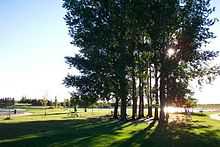Birds Hill Provincial Park
Birds Hill Provincial Park is a provincial park in Manitoba, Canada. It is located 24 kilometres north of Winnipeg on Highway 59, (50°01′28″N 96°53′01″W / 50.02444°N 96.88361°WCoordinates: 50°01′28″N 96°53′01″W / 50.02444°N 96.88361°W) and covers approximately 8300 acres (35.1 square kilometres). The area (and park) is named after Dr. Curtis Bird, first speaker of the Manitoba provincial legislature in 1873, whose father had been a factor in the Hudson's Bay Company and received a large land grant at this location. Since the area is higher than the surrounding terrain, what is now Birds Hill Park served early settlers as a refuge from flooding in the years 1826 and 1852. It is part of the RM of Springfield, with a relatively small portion lying within the Rural Municipality of St. Clements.

The provincial park features a mixture of aspen and oak forest with open prairie/savannah, spruce, bog areas and mixed boreal forest communities, not commonly found so close together.
Overview

The park has a large campground, a horse stable, and many trails designed for hiking, biking and horseback riding. An artificial lake of approximately 80 acres (30 ha) with four miles of shoreline supports swimming and water recreation.
The park was formed from land expropriated from 150 local landowners in 1964. The official opening date was marked by a ribbon cutting ceremony by Manitoba premier Duff Roblin on July 15, 1967.[1]
Every July since 1974, the park has been the site of the Winnipeg Folk Festival. In September 1984, the park hosted Pope John Paul II during his visit to Manitoba.
The north section of the park is designated as a wilderness area, with no development of any kind. Most of the park once formed an island and shorelines at the end of the last ice age. The soil is very sandy, and the area has many stunted oak trees. There are many gravel pits that surround the park. Birds Hill Park provides one of the largest concentrations of white tailed deer in North America. The Birds Hill upland (including the Park) supports Canada's largest population of Western Silvery Aster, a species protected under federal and provincial Endangered Species laws.[2]
The park contains a small cemetery where many of the early settlers of the area are buried.
See also
- Birds Hill, Manitoba
- List of Manitoba parks
References
- Aileen Kraushar et al., "Springfield 1st Rural Municipality in Manitoba 1873-1973", Dugald Women's Institute, Dugald Manitoba Canada 1974, ISBN 0-919212-40-9